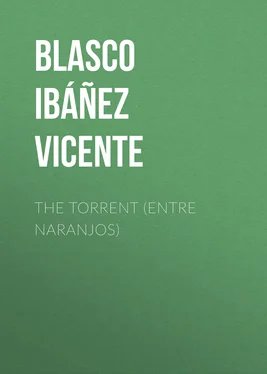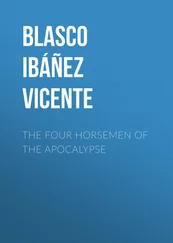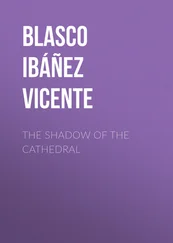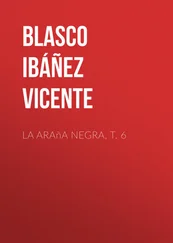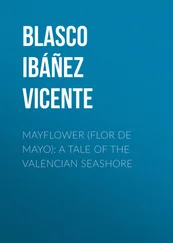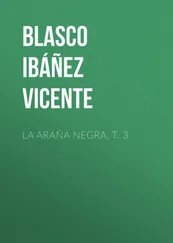Vicente Blasco Ibáñez - The Torrent (Entre Naranjos)
Здесь есть возможность читать онлайн «Vicente Blasco Ibáñez - The Torrent (Entre Naranjos)» — ознакомительный отрывок электронной книги совершенно бесплатно, а после прочтения отрывка купить полную версию. В некоторых случаях можно слушать аудио, скачать через торрент в формате fb2 и присутствует краткое содержание. Жанр: foreign_prose, foreign_antique, на английском языке. Описание произведения, (предисловие) а так же отзывы посетителей доступны на портале библиотеки ЛибКат.
- Название:The Torrent (Entre Naranjos)
- Автор:
- Жанр:
- Год:неизвестен
- ISBN:нет данных
- Рейтинг книги:4 / 5. Голосов: 1
-
Избранное:Добавить в избранное
- Отзывы:
-
Ваша оценка:
- 80
- 1
- 2
- 3
- 4
- 5
The Torrent (Entre Naranjos): краткое содержание, описание и аннотация
Предлагаем к чтению аннотацию, описание, краткое содержание или предисловие (зависит от того, что написал сам автор книги «The Torrent (Entre Naranjos)»). Если вы не нашли необходимую информацию о книге — напишите в комментариях, мы постараемся отыскать её.
The Torrent (Entre Naranjos) — читать онлайн ознакомительный отрывок
Ниже представлен текст книги, разбитый по страницам. Система сохранения места последней прочитанной страницы, позволяет с удобством читать онлайн бесплатно книгу «The Torrent (Entre Naranjos)», без необходимости каждый раз заново искать на чём Вы остановились. Поставьте закладку, и сможете в любой момент перейти на страницу, на которой закончили чтение.
Интервал:
Закладка:
Behind the Hermitage all the lower ribera stretched, one expanse of rice-fields drowned under an artificial flood; then, Sueca and Cullera, their white houses perched on those fecund lagoons like towns in landscapes of India; then, Albufera, with its lake, a sheet of silver glistening in the sunlight; then, Valencia, like a cloud of smoke drifting along the base of a mountain range of hazy blue; and, at last, in the background, the halo, as it were, of this apotheosis of light and color, the Mediterranean—the palpitant azure Gulf bounded by the cape of San Antonio and the peaks of Sagunto and Almenara, that jutted up against the sky-line like the black fins of giant whales.
As Rafael looked down upon the towers of the crumbling convent of La Murta, almost hidden in its pine-groves, he thought of all the tragedy of the Reconquest; and almost mourned the fate of those farmer-warriors whose white cloaks he could imagine as still floating among the groves of those magic trees of Asia's paradise. It was the influence of the Moor in his Spanish ancestry. Christian, clerical even, though he was, he had inherited a melancholy, dreamy turn of mind from the very Arabs who had created all that Eden.
He pictured to himself the tiny kingdoms of those old walis ; vassal districts very like the one his family ruled. But instead of resting on influence, bribery, intimidation, and the abuse of law, they lived by the lances of horsemen as apt at tilling the soil as at capering in tournaments with an elegance never equalled by any chevaliers of the North. He could see the court of Valencia, with the romantic gardens of Ruzafa, where poets sang mournful strophes over the wane of the Valencian Moor, while beautiful maidens listened from behind the blossoming rose-bushes. And then the catastrophe came. In a torrent of steel, barbarians swept down from the arid hills of Aragon to appease their hunger in the bounty of the plain—the almogávares —naked, wild, bloodthirsty savages, who never washed. And as allies of this horde, bankrupt Christian noblemen, their worn-out lands mortgaged to the Israelite, but good cavalrymen, withal, armored, and with dragonwings on their helmets; and among the Christians, adventurers of various tongues, soldiers of fortune out for plunder and booty in the name of the Cross —the "black sheep" of every Christian family. And they seized the great garden of Valencia, installed themselves in the Moorish palaces, called themselves counts and marquises, and with their swords held that privileged country for the King of Aragon, while the conquered Saracens continued to fertilize it with their toil.
"Valencia, Valencia, Valencia! Thy walls are ruins, thy gardens grave-yards, thy sons slaves unto the Christian …" groaned the poet, covering his eyes with his cloak. And Rafael could see, passing like phantoms before his eyes, leaning forward on the necks of small, sleek, sinewy horses, that seemed to fly over the ground, their legs horizontal, their nostrils belching smoke, the Moors, the real people of Valencia, conquered, degenerated by the very abundance of their soil, abandoning their gardens before the onrush of brutal, primitive invaders, speeding on their way toward the unending night of African barbarism. At this eternal exile of the first Valencians who left to oblivion and decay a civilization, the last vestiges of which today survive in the universities of Fez, Rafael felt the sorrow he would have experienced had it all been a disaster to his family or his party.
While he was thinking of all these dead things, life in its feverish agitation surrounded him. A cloud of sparrows was darting about the roof of the Hermitage. On the mountain side a flock of dark-fleeced sheep was grazing; and when any of them discovered a blade of grass among the rocks, they would begin calling to one another with a melancholy bleating.
Rafael could hear the voices of some women who seemed to be climbing the road, and from his reclining position he finally made out two parasols that were gradually rising to view over the edge of his bench. One was of flaming red silk, skilfully embroidered and suggesting the filigreed dome of a mosque; the second, of flowered calico, was apparently keeping at a respectful distance behind the first.
Two women entered the little square, and as Rafael sat up and removed his hat, the taller, who seemed to be the mistress, acknowledged his courtesy with a slight bow, went on to the other end of the esplanade, and stood, with her back turned toward him, looking at the view. The other sat down some distance off, breathing laboriously from the exertion of the climb.
Who were those women?… Rafael knew the whole city, and had never seen them.
The one seated near him was doubtless the servant of the other—her maid or her companion. She was dressed in black, simply but with a certain charm, like the French soubrettes he had seen in illustrated novels. But rustic origin and lack of cultivation were evident from the stains on the backs of her unshapely hands; from her broad, flat, finger-nails; and from her large ungainly feet, quite out of harmony with the pair of stylish boots she was wearing—cast-off articles, doubtless, of the lady. She was pretty, nevertheless, with a fresh exuberance of youth. Her large, gray, credulous eyes were those of a stupid but playful lamb; her hair, straight, and a very light blond, hung loosely here and there over a freckled face, dark with sunburn. She handled her closed parasol somewhat awkwardly and kept looking anxiously at the doubled gold chain that drooped from her neck to her waist, as if to reassure herself that a gift long-coveted had not been lost.
Rafael's interest drifted to the lady. His eyes rested on the back of a head of tightly-gathered golden hair, as luminous as a burnished helmet; on a white neck, plump, rounded; on a pair of broad, lithe shoulders, hidden under a blue silk blouse, the lines tapering rapidly, gracefully toward the waist; on a gray skirt, finally, falling in harmonious folds like the draping of a statue, and under the hem the solid heels of two shoes of English style encasing feet that must have been as agile and as strong as they were tiny.
The lady called to her maid in a voice that was sonorous, vibrant, velvety, though Rafael could catch only the accented syllables of her words, that seemed to melt together in the melodious silence of the mountain top. The young man was sure she had not spoken Spanish. A foreigner, almost certainly!…
She was expressing admiration and enthusiasm for the view, talking rapidly, pointing out the principal towns that could be seen, calling them by their names,—the only words that Rafael could make out clearly. Who was this woman whom he had never seen, who spoke a foreign language and yet knew the ribera well? Perhaps the wife of one of the French or English orange-dealers established in the city! Meanwhile his eyes were devouring that superb, that opulent, that elegant beauty which seemed to be challenging him with its indifference to his presence.
The keeper of the Hermitage issued cautiously from the house—a peasant who made his living from visitors to the heights. Attracted by the promising appearance of the strange lady, the hermit came forward to greet her, offering to fetch water from the cistern, and to unveil the image of the miraculous virgin, in her honor.
The woman turned around to answer the man, and that gave Rafael an opportunity to study her at his leisure. She was tall, ever so tall, as tall as he perhaps. But the impression her height of stature made was softened by a grace of figure that revealed strength allied to elegance. A strong bust, sculpturesque, supporting a head that engaged the young man's wrapt attention. A hot mist of emotion seemed to cloud his vision as he looked into her large eyes, so green, so luminous! The golden hair fell forward upon a forehead of pearly whiteness, veined at the temples with delicate lines of blue. Viewed in profile her gracefully moulded nose, quivering with vitality at the nostrils, filled out a beauty that was distinctly modern, piquantly charming. In those lineaments, Rafael thought he could recognize any number of famous actresses. He had seen her before. Where?… He did not know. Perhaps in some illustrated weekly! Perhaps in some album of stage celebrities! Or maybe on the cover of some match-box—a common medium of publicity for famous European belles. Of one thing he was certain: at sight of that wonderful face he felt as though he were meeting an old friend after a long absence.
Читать дальшеИнтервал:
Закладка:
Похожие книги на «The Torrent (Entre Naranjos)»
Представляем Вашему вниманию похожие книги на «The Torrent (Entre Naranjos)» списком для выбора. Мы отобрали схожую по названию и смыслу литературу в надежде предоставить читателям больше вариантов отыскать новые, интересные, ещё непрочитанные произведения.
Обсуждение, отзывы о книге «The Torrent (Entre Naranjos)» и просто собственные мнения читателей. Оставьте ваши комментарии, напишите, что Вы думаете о произведении, его смысле или главных героях. Укажите что конкретно понравилось, а что нет, и почему Вы так считаете.
